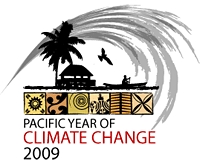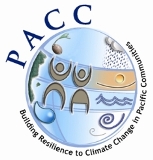Climate
Change, Climate Variability and Sea Level Rise
The
Intergovernmental Panel on Climate Change (IPCC) continues
to report that expected climatic changes over the region will
stimulate an increase in extreme weather events that include;
higher maximum temperatures, increased number of hot days,
more intense rainfall over some areas and an increased frequency
and severity of tropical cyclones.
The
international community has initiated steps under the United
Nations Framework Convention on Climate Change (UNFCCC) to
stabilize greenhouse gases in the atmosphere and promoted
carbon trading to assist with this overall objective under
its Kyoto Protocol. However progress has been slow. While
the global commitment needed to stabilise greenhouse gases
has not been evident in the climate change convention negotiations,
good progress has been made to reduce ozone-depleting substances.
In 2003, mainstreaming climate change into development plans
assumed much importance. It was highlighted at the World Summit
on Sustainable Development (WSSD), the Delhi Declaration of
the 8th Conference of the Parties to the UNFCCC and in the
latest Global environment Facility (GEF) Council Guidance
especially in relation to adaptation. Multilateral and bilateral
donors also require mainstreaming to be shown as a precondition
to assistance. While funding for Adaptation under the Special
Climate Change Fund of the UNFCCC has not materialised, Least
Developed Countries (LDCs) received or are close to receiving
their money under the National Adaptation Plans of Action.
SPREP
members have identified five main focal areas to guide the
strategic direction for this programme.
Strengthened
Meteorological Services
Objective: meteorological and climatological capacities of
Pacific Island Countries (PICs) need to be strengthened to
plan and respond to climate variability and extreme weather
events.
Project: PIGCOS
Understanding
Climate Change, Variability and sea level rise
Objective:
to reduce uncertainties in climate prediction and scenario
development through the use of clearinghouse mechanisms.
More research needs to be done to understand climate variability,
climate change and sea level rise through information, modelling
and clearinghouse mechanisms. Such research needs to identify
and assess vulnerabilities as well as impacts.
Project: ARMS
Vulnerability,
Adaptation and Mitigation
Objective:
to develop frameworks for analysing Impacts and Vulnerability
and develop adaptation response measures
Pacific islands urgently need to adapt to climate change and
adopt mitigation options and coordination and assistance is
needed to assess and implement feasible options and access
funds for implementation of activities.
Project: CBDAMPIC, PIGGAREP
Policy
Development on Climate Change
Objective:
To enhance the development of climate change policy in PICs
internationally, regionally and nationally and to identify
and secure funding
Technical/legal advisory services needs to be provided to
assist Pacific island parties implement the UNFCCC and to
ensure consistency with other international processes such
as the WSSD Type II initiatives, Barbados Plan of Action +10.
Linkages also need to be made with the Convention on Biological
Diversity and related instruments such as the Convention on
Desertification. At the regional level SPREP will continue
to coordinate the Regional Framework for climate change and
its attendant round-table process, and assist with mainstreaming
climate change into developmental processes and capacity building
activities.
No project, make a Policy page
Ozone-Depleting
Substances
Objective:
To assist in facilitating the phase-out of CFCs by 2005 in
eight core countries
Taking into account the linkages between ozone-depleting substances
(chlorofluorocarbons) and greenhouse gases, SPREP is working
to implement the objectives of Montreal Protocol on Substances
that Deplete the Ozone Layer to the Vienna Convention for
the Protection of the Ozone Layer, to eliminate ozone depleting
substances by the year 2005.
Project: ODS
|










